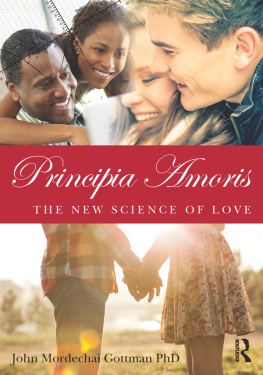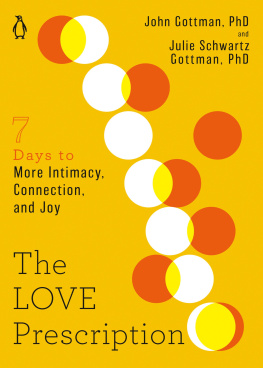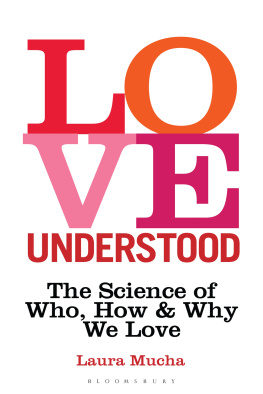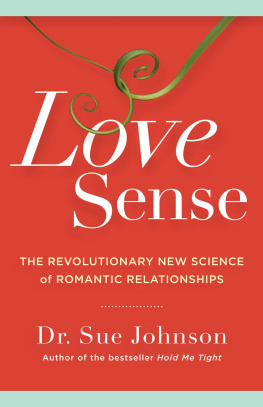Principia Amoris
Stereotypically, science and emotion are diametric opposites: one is cold and unfeeling, the other soft and nebulous; one is based on proven facts while the other is based on inexplicable feelingsand never the twain shall meet, until now.
John Gottman delves into the unquantifiable realm of love, armed with science and logic, and emerges with the knowledge that relationships can be not only understood, but also predicted, as well. Based on research done at his Love Lab and other laboratories, Gottman has discovered that the future of love relationships can be predicted with a startling 75% success rate. These predictions can help couples to prevent disasters in their relationships, recognize the signs of a promising relationship, and, perhaps more importantly, recognize the signs of a doomed one.
Principia Amoris also introduces Love Equations, a mathematical modeling of relationships that helps understand predictions. Love Equations are powerful tools that can prevent relationship distress and heal ailing relationships. Readers learn about the various research and studies that were done to discover the science behind love, and are treated to a history of the people, ideas, and events that shaped our current understanding. They also learn about:
The Four Horsemen of the Apocalypse
45 Natural Principles of Love
5 Couple Types
5 Recipes for Good Relationships
And much more!
Just as science helped us to understand the physical world, it is helping us to understand the emotional world. Using the insights in this book, mental health professionals can meaningfully help their distressed clients, as well as better understand why a relationship is failing or succeeding. Appropriate for the curious non-mental health professional as well, Principia Amoris is a must-have on any bookshelf!
John Mordechai Gottman, PhD, is a scholar and researcher renowned for his work on marital stability and divorce prediction. He has conducted 40 years of research with thousands of couples and is the cofounder, with his wife, Dr. Julie Schwartz Gottman, of the Gottman Institute. He is also the executive director of the affiliated Relationship Research Institute and a professor emeritus of psychology at the University of Washington, where he founded The Love Lab. More information about John and the Gottman Institute is available at www.gottman.com.
Principia Amoris
The New Science of Love
John Mordechai Gottman, PhD

First published 2015
by Routledge
711 Third Avenue, New York, NY 10017
and by Routledge
27 Church Road, Hove, East Sussex BN3 2FA
Routledge is an imprint of the Taylor & Francis Group, an informa business
2015 John Mordechai Gottman
The right of John Mordechai Gottman to be identified as author of this work has been asserted by him accordance with sections 77 and 78 of the Copyright, Designs and Patents Act 1988.
All rights reserved. No part of this book may be reprinted or reproduced or utilised in any form or by any electronic, mechanical, or other means, now known or hereafter invented, including photocopying and recording, or in any information storage or retrieval system, without permission in writing from the publishers.
Trademark notice: Product or corporate names may be trademarks or registered trademarks, and are used only for identification and explanation without intent to infringe.
Library of Congress Cataloging in Publication Data
Gottman, John Mordechai.
Principia amoris: the new science of love/John Mordechai Gottman.
pages cm
Includes bibliographical references and index.
1. Love. 2. Interpersonal attraction. I. Title.
BF575.L8.G675 2015
152.41dc23
2014017764
ISBN: 978-0-415-64155-5 (hbk)
ISBN: 978-0-415-64156-2 (pbk)
ISBN: 978-0-203-08178-5 (ebk)
Typeset in Bembo
by Swales & Willis Ltd, Exeter, Devon, UK
Table of Contents
Science was revolutionized in the second half of the 17th century when Isaac Newton published the first edition of his book Mathematical Principles of Natural Philosophy. It fondly became known as The Principia. The book inspired the imagination of scientists everywhere throughout Europe and launched new philosophies in the Age of Reason. It was, without a doubt, one of the greatest books of all time.
The new mathematics Newton (and Leibniz) developed helped to describe gravity, unifying the motions of a projectile on our planet, which Galileo Galilei had identified, with the motions of the moon and the revolutions of the planets around our sun. What a grand unification! The laws of all of motion were revealed in a few simple equations and just three principles.
Newton was afraid to say much about the new math he had inventedthe differential calculusso he presented all his proofs geometrically, in a language familiar to his contemporaries. It wasnt until Leibniz introduced calculus to the world that Newton announced that he had discovered the calculus much earlier. My physics professor, the late Philip Baumel, said that Newtons translation from calculus to geometry was as great a task as discovering the three principles of motion in the first place. Making math palatable was a challenge even in the 17th century. It still is.
The great astronomer Johannes Keplers lifetime achievement in 1619 was discovering the three laws of the elliptical motions of the planets. That monumental discovery was based on the painstaking and careful observations of the motions of the known planets (without a telescope) by Tycho Brahe. Keplers discovery of the elliptical orbits of planets was a huge advance in our understanding of nature. It was the crowning achievement of his entire lifetime.
Yet Keplers own relationships with people, including his relationship with his mother and his own marriage, were extremely tortured. He could comprehend the motions of the planets, but the emotions of humans eluded his great mind.
Among Newtons Principias truly amazing and awe inspiring results were that Keplers laws were deduced by Newton from the general principles of the inverse square law of gravitation and conic sections. How that must have moved scientists in his day! Newton, in his astonishing lifetime, not only revealed the laws of motion, but, probably more importantly, taught us, together with Galileo Galilei, how to think about scientific experiments.
Yet despite his incredible genius, Newtons own love relationships with other people were, like those of Kepler, either nonexistent, or highly arduous.
Three centuries later, Albert Einstein fundamentally changed much of what Newton had discovered, and created an even more beautiful understanding that unified space, time, mass, energy, and gravity. He summarized his findings in an elegant equation in 1916 using the math of differential geometry and tensor analysis in his theory of general relativity. It was a stunning achievement.
After World War I, in 1919, a British expedition launched to see if stars could bend light confirmed the general theory of relativity. After that senseless Great War, it was remarkable that a British expedition set out to test a German scientists theory. The expedition inspired a new sense of the unifying international nature of scientific exploration.
The amazing results of that journey rocketed Einstein into a new position of international science celebrity, which was a real first. The public was used to Hollywood movie stars becoming world-wide celebrities, but not scientists. The public loved Einstein. As he grew older, his words became almost synonymous with wisdom itself. In some Internet searches, Einstein is considered the most quoted person in history. Yet Einsteins own love relationships were also tortured, and, by his own admission, mostly unsuccessful.













